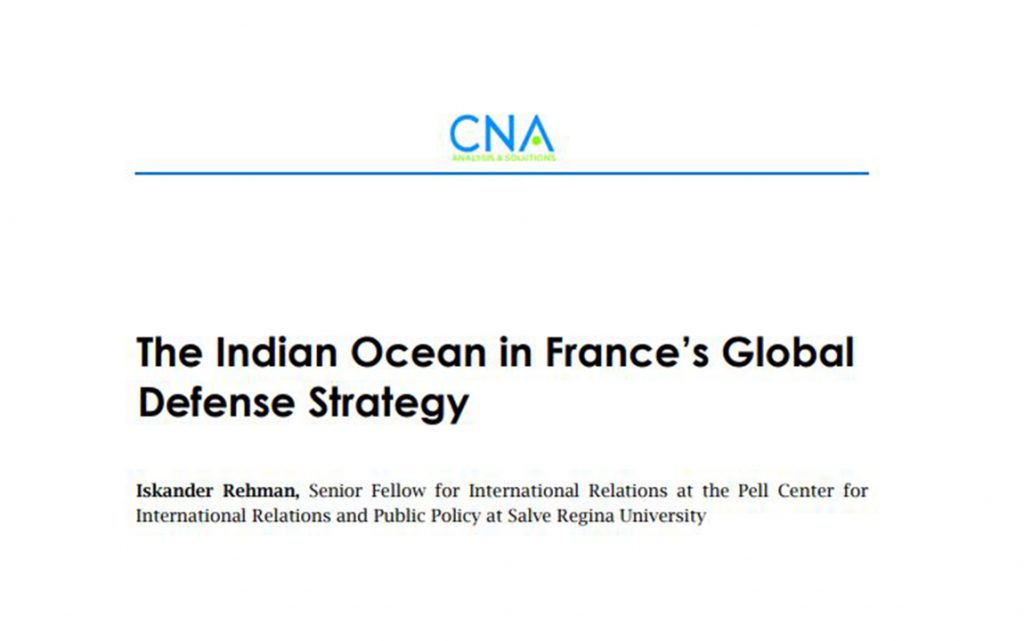Rehman on the Indian Ocean in France’s Global Defense Strategy
On January 18, 2018, the Center for Naval Analyses (CNA) convened a roundtable to discuss France’s strategic interests in the Indian Ocean. Nilanthi Samaranayake, Director of CNA’s Indian Ocean and South Asia Security Program, framed the discussion by noting the expanding role of extraregional actors operating in the Indian Ocean, including Japan, China, and France. The United States, Japan, India, and Australia have revamped their “Quad” discussions over the past year. However, Ms. Samaranayake noted, France has a range of territorial, economic, and security interests in the Indian Ocean, and the roundtable offered an opportunity to examine those interests and potential opportunities to deepen U.S.-French cooperation in the region. Admiral James Foggo, Commander, U.S. Naval Forces Europe and Commander, U.S. Naval Forces Africa, was not able to participate personally in the roundtable but he sent remarks highlighting the strategic alliance between the U.S. and French navies and urging that the existing robust “esprit de corps” be harnessed to promote maritime security and regional stability in the Indian Ocean. ADM Foggo advanced several specific suggestions for U.S.-French naval cooperation in the region, including exploring new opportunities and venues to engage with China’s navy, especially in East Africa and the wider Indian Ocean; inviting India to observe (and later participate in) the CUTLASS EXPRESS exercise sponsored by U.S. Africa Command (AFRICOM) and executed by U.S. Naval Forces Africa; and building on France’s newly formalized strategic relationships with India, Australia, and South Africa. ADM Foggo’s statement follows. The principal speaker at the January 18 CNA roundtable was French security policy expert Dr. Iskander Rehman, Senior Fellow for International Relations at the Pell Center for International Relations and Public Policy at Salve Regina University in Rhode Island. Dr. Rehman’s paper concludes this document.
As Dr. Rehman explained, among the growing number of states with a presence in the Indian Ocean, France has a fairly unique position as a European Union member which is also a nation of the Indian Ocean Rim. La Réunion and Mayotte, former colonies of France acquired in the late 17th century / early 18th century, are now departments of France. Today, more than 1.5 million French citizens and 130,000 French expatriates live in the Indo-Pacific region, where France has significant commercial and strategic interests.
Dr. Rehman noted that French investment capital in the Indo-Pacific is four times greater than Asian investments in France. In the Indian Ocean, France delineates two strategic theaters: the Persian Gulf and Gulf of Aden; and the Southwest Indian Ocean. From inter-service military bases in Djibouti and Abu Dhabi, France pursues a range of missions, including: countering terrorism; fighting ISIS; containing Iran’s ambitions; fulfilling informal security guarantees to Gulf state partners; ensuring the free flow of shipping; and projecting force into the Indian Ocean.
In the Southwest Indian Ocean, France seeks to defend French national territory and French citizens in La Réunion and Mayotte and a vast exclusive 2 economic zone associated with uninhabited island territories in the Mozambique Channel and the remote Southern Ocean.
Dr. Rehman pointed out that, with over 30,000 troops deployed and ongoing operations in a number of theaters, France’s operational ability was currently stretched thin. Nevertheless, as a middle power with global outreach, France is committed to contributing to the security of the region.
Key roles in the Indo-Pacific which the French military exercises alone and in coordination with the United States include:
• Shaping the regional balance of power through capacity building and strategically driven arms sales
• Conducting maritime rescue and disaster relief
• Upholding informal security guarantees to certain Gulf States vis-à-vis Iran
• Bolstering U.S. counterterrorism, intelligence, and counter-proliferation efforts along an arc of instability from Dakar to Peshawar
• Helping secure critical straits and chokepoints, including the Mozambique channel
To augment its regional presence, France has sought to establish a series of ambitious strategic partnerships—the most significant of which is with India. In recent years, Dr. Rehman noted that France has shown a greater willingness to criticize China’s regional behavior, while elevating its relationship with Japan and embarking on a newly enhanced partnership with Australia.
Download the full paper, “The Indian Ocean in France’s Global Defense Strategy,” by Dr. Iskander Rehman.

